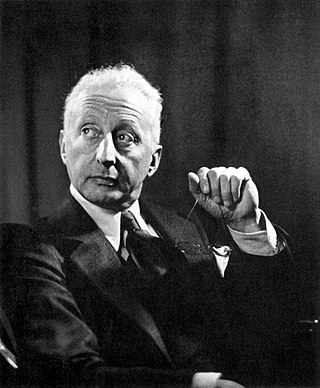
Jerome David Kern was an American composer of musical theatre and popular music. One of the most important American theatre composers of the early 20th century, he wrote more than 700 songs, used in over 100 stage works, including such classics as "Ol' Man River", "Can't Help Lovin' Dat Man", "A Fine Romance", "Smoke Gets in Your Eyes", "The Song Is You", "All the Things You Are", "The Way You Look Tonight" and "Long Ago ". He collaborated with many of the leading librettists and lyricists of his era, including George Grossmith Jr., Guy Bolton, P. G. Wodehouse, Otto Harbach, Oscar Hammerstein II, Dorothy Fields, Johnny Mercer, Ira Gershwin and Yip Harburg.

Desilu Productions, Inc. was an American television production company founded and co-owned by husband and wife Desi Arnaz and Lucille Ball. The company is best known for shows such as I Love Lucy, The Lucy Show, Mannix, The Untouchables, Mission: Impossible and Star Trek. Until 1962, Desilu was the second-largest independent television production company in the United States, behind MCA's Revue Studios, until MCA bought Universal Pictures and Desilu became and remained the number-one independent production company, until Ball sold it to Gulf and Western Industries in 1968.
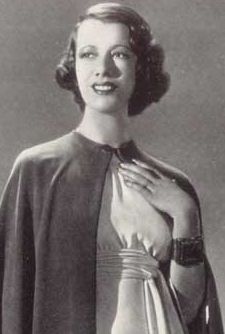
Alice Joséphine Pons, known professionally as Lily Pons, was a French-American operatic lyric coloratura soprano and actress who had an active career from the late 1920s through the early 1970s. As an opera singer, she specialized in the coloratura soprano repertoire and was particularly associated with the title roles in Lakmé and Lucia di Lammermoor. In addition to appearing as a guest artist with many opera houses internationally, Pons enjoyed a long association with the Metropolitan Opera in New York City, where she performed nearly 300 times between 1931 and 1960.

Swing Time is a 1936 American musical comedy film, the sixth of ten starring Fred Astaire and Ginger Rogers. Directed by George Stevens for RKO, it features Helen Broderick, Victor Moore, Betty Furness, Eric Blore and Georges Metaxa, with music by Jerome Kern and lyrics by Dorothy Fields. Set mainly in New York City, the film follows a gambler and dancer, "Lucky" (Astaire), who is trying to raise money to secure his marriage when he meets dance instructor Penny (Rogers) and begins dancing with her; the two soon fall in love and are forced to reconcile their feelings.
Show Boat is a 1936 American romantic musical film directed by James Whale, based on the 1927 musical of the same name by Jerome Kern and Oscar Hammerstein II, which in turn was adapted from the 1926 novel of the same name by Edna Ferber.

Follow the Fleet is a 1936 American RKO musical comedy film with a nautical theme starring Fred Astaire and Ginger Rogers in their fifth collaboration as dance partners. It also features Randolph Scott, Harriet Hilliard, and Astrid Allwyn, with music and lyrics by Irving Berlin. Lucille Ball and Betty Grable also appear, in supporting roles. The film was directed by Mark Sandrich with script by Allan Scott and Dwight Taylor based on the 1922 play Shore Leave by Hubert Osborne.
Constantin Bakaleinikoff was a Russian-American composer.

Klondike Annie is a 1936 American Drama film starring Mae West and Victor McLaglen. The film was co-written by West from her play Frisco Kate, which she wrote in 1921 and a story written by the duo Marion Morgan and George Brendan Dowell. Raoul Walsh directed.

That's Right – You're Wrong is a 1939 American musical film directed by David Butler and released by RKO Radio Pictures. The film stars Kay Kyser and his band, with a cast that included Adolphe Menjou, Lucille Ball, Edward Everett Horton, Roscoe Karns, and Ginny Simms. It was the first film to feature Kyser and his band, and its success led to their headlining several more pictures over the next five years. The title was a Kyser catchphrase, used on his radio show when a contestant correctly gave a wrong answer to a "right or wrong" question.

Dance, Girl, Dance is a 1940 American comedy-drama film directed by Dorothy Arzner and starring Maureen O'Hara, Louis Hayward, Lucille Ball, and Ralph Bellamy. The film follows two dancers who strive to preserve their own integrity while fighting for their place in the spotlight and for the affections of a wealthy young suitor.

Roberta is a 1935 American musical film released by RKO Radio Pictures and directed by William A. Seiter. It stars Irene Dunne, Fred Astaire, Ginger Rogers, and features Randolph Scott, Helen Westley, Victor Varconi and Claire Dodd. The film was an adaptation of the 1933 Broadway musical Roberta, which in turn was based on the novel Gowns by Roberta by Alice Duer Miller. It was a solid hit, showing a net profit of more than three-quarters of a million dollars.

Street Girl is a 1929 pre-Code musical film directed by Wesley Ruggles and starring Betty Compson, John Harron and Jack Oakie. It was adapted by Jane Murfin from "The Viennese Charmer", a short story by William Carey Wonderly. While it was the first film made by RKO Radio Pictures, its opening was delayed until after Syncopation, making it RKO's second release. It was very successful at the box office, accounting for almost half of RKO's profits for the entire year.

The Trail of the Lonesome Pine is a 1936 American adventure romance western film based on the 1908 novel of the same name. The picture was directed by Henry Hathaway starring Fred MacMurray, Sylvia Sidney and Henry Fonda.
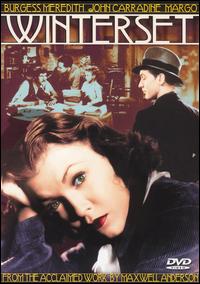
Winterset is a 1936 American crime film directed by Alfred Santell, based on the 1935 play of the same name by Maxwell Anderson, in a loose dramatization of the Sacco and Vanzetti trial and execution in 1928. The script retains elements of the blank verse poetic meter on which Anderson based his 1935 Winterset Broadway theater production.
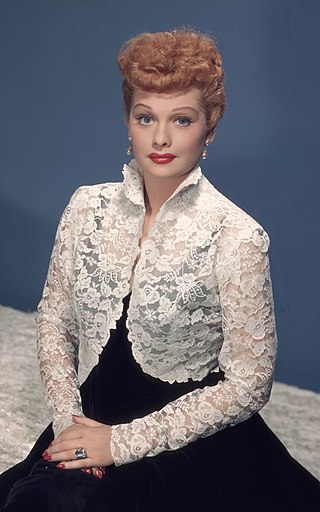
Lucille Désirée Ball was an American actress and comedienne. She was nominated for 13 Primetime Emmy Awards, winning five times, and was the recipient of several other accolades, such as the Golden Globe Cecil B. DeMille Award and two stars on the Hollywood Walk of Fame. She earned many honors, including the Women in Film Crystal Award, an induction into the Television Hall of Fame, a Kennedy Center Honor, and the Governors Award from the Academy of Television Arts & Sciences.

The Big Street is a 1942 American drama film starring Henry Fonda and Lucille Ball, based on the 1940 short story "Little Pinks" by Damon Runyon, who also produced it. It was directed by Irving Reis from a screenplay by Leonard Spigelgass.

That Girl from Paris is a 1936 American musical comedy film directed by Leigh Jason and starring Lily Pons, Jack Oakie, and Gene Raymond. The film made a profit of $101,000. John O. Aalberg was nominated for an Academy Award in the category Sound Recording.
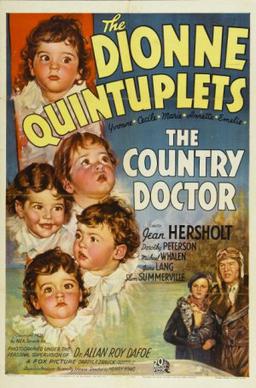
The Country Doctor is a 1936 American drama film directed by Henry King and written by Sonya Levien. The film stars Jean Hersholt, June Lang, Slim Summerville, Michael Whalen, Dorothy Peterson and Robert Barrat. The Country Doctor was released on March 12, 1936, by 20th Century Fox.

Merchant of Love is a 1935 French comedy film directed by Edmond T. Gréville and starring Jean Galland, Rosine Deréan and Françoise Rosay. The film's sets were designed by the art director Pierre Schild.

















